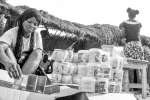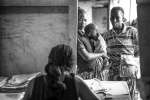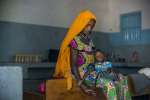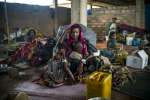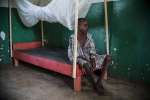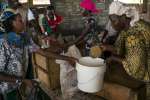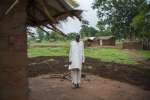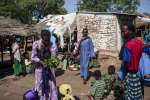- Text size
 |
|  |
|  |
| 
- عربي
UNHCR condemns attack on camp for internally displaced in Central African Republic town of Batangafo
Press Releases, 11 November 2015
The UN refugee agency, concerned about spreading insecurity in the volatile Central African Republic, today condemned violence around the country, including a killing and revenge attack on a camp for internally displaced people (IDP) in the town of Batangafo.
On Tuesday, rebel fighters entered the Batangafo camp to reportedly avenge the killing of two young Muslim men earlier that day in the same camp. They fired shots and torched huts and community shelters, triggering panic and killing five people, according to a preliminary report.
The dead included an elderly woman burnt to death in her shelter. Some 5,500 people fled the camp and sought shelter in safer areas near a camp for UN peace-keepers and the compound of Médecins Sans Frontières. About 730 huts were destroyed in the attack along with a youth centre.
Fresh violence and forced displacement was also reported from the central city of Bambari and surrounding areas. On Wednesday morning, armed men believed to be ex-Seleka killed two students in Bambari.
This followed an attack last Friday on the village of Awatche, some 25 kms from Bambari, which forced some 900 people to flee to a UNHCR-run camp housing 1,850 Sudanese refugees in Pladama Ouaka.
"We strongly condemn these horrific acts that have cost the lives of innocent people. We call on all actors to restore calm and respect the civilian and humanitarian character of IDP camps," said Charles Mballa, UNHCR's Deputy Representative to CAR. "We all have a shared responsibility to protect civilians and preserve the neutrality and security of safe havens," he added.
Yesterday's events in Batangafo are another reminder that any incident can trigger spiralling violence. Despite relative calm since January 2015, the capital Bangui has been severely affected by violence since September 26, when armed clashes left at least 90 people dead and forced more than 40,000 people to flee to safer areas following the killing of a Muslim taxi driver.
Until the latest violence, the Central African Republic had an internally displaced population estimated at 399,000 (as of mid-October), while almost 460,000 had fled to neighbouring countries.
- Contacts:
- In Bangui, Dalia Al Achi mobile +236 726 75186
- In Geneva, Leo Dobbs mobile +41 79 883-6347





